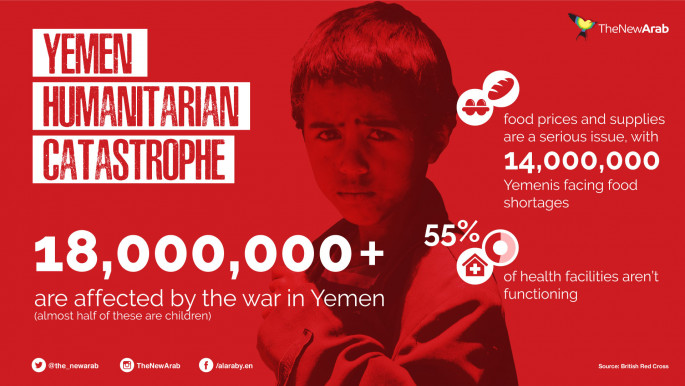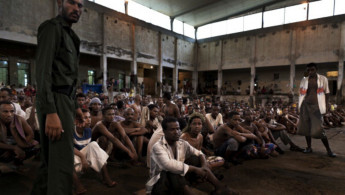Thousands of 'disappeared' under Yemen's reign of terror
"It was a horrible, horrible experience," political activist Abdulkader Guneid told The New Arab.
"But what is worse is being left there, not knowing anything about your family. What breaks prisoners is that they don't know when it will end. There is no verdict. This is a killer."
Guneid was taken from his house on August 5, 2015, by the Houthi militia, and held incommunicado for more than nine months without charge or trial. A physician and once the mayor of Taiz, he is a member of the Islamist opposition party al-Islah, and a vocal critic of the Houthi rebels and ousted President Ali Abdullah Saleh.
"The first month I invented a name for each day of abduction… according to the most remarkable experience that I had that day. Then I began counting. I was abducted for 300 days."
 |
What breaks prisoners is that they don't know when it will end. There is no verdict. This is a killer |  |
Guneid is not alone. Forty researchers from the Social Fund for Development were abducted on April 14 while conducting a survey in Dharam governorate, accused of working for Western organisations, says Yousuf Aburas. He is a consultant for the Yemeni Coalition for Monitoring Human Rights Violations (YCMHRV).
They are thought to be held in Zaraga prison, in the centre of Al-Hada district, but little is known about their condition.
The Houthi-Saleh alliance last week declared a state of emergency, formally suspending the rule of law. "We were living in a state of emergency even before, but now they are making it legal by enforcing the state of emergency law," says Aburas.
In a recent report, the group documented more than 5,000 cases of enforced disappearance and arbitrary detention in 2016 alone, including that of 118 children and 20 women.
 |
|
| [Click to enlarge] |
Politicians are targeted most, with 1,032 disappeared. At least 703 activists and 297 academics have been taken.
Moreover, 1,772 ordinary citizens are known to have been "disappeared".
The group warns that the real numbers are likely to be much higher, as abductees' relatives are often reluctant to report their missing family members for fear of reprisal.
The Houthis and Al-Saleh militias are thought to be responsible for 95 percent of these enforced disappearance cases, but the security forces of the internationally recognised government of President Abdrabbuh Mansur Hadi are also guilty of at least 220 cases.
Al-Qaeda in the Arab Peninsula (AQAP), the armed group that has taken advantage of the conflict to reassert itself here, attacking both sides, has kidnapped at least four people, while 27 documented abductions remain unattributed.
"We sent our report to all parties," says Aburas. "The Houthis didn't respond. The [Hadi] government said they would make a check, but they don't have the capabilities of correcting our figures."
Hadi's Aden government has put out its own figures. From January 2015 until February 2017, they say, their agencies documented 16,804 cases of arbitrary detentions, torture, and forced disappearance at the hands of the Houthis - but they neglected to address evidence of their own human rights violations.
 |
Torture is horrible. I was in jail with someone who was beaten in a way that got him paralysed, and then he was castrated |  |
Detainees are being denied their legal rights and their most basic needs. Torture is widespread and documented in 813 cases between December 2014 and December 2016. Again, whereas the Houthi-Saleh forces are responsible for the great majority of documented cases, YCMHRV documented 30 torture cases in prisons held by government authorities, especially in Aden and Hadhramout governorates.
There were also five torture cases committed by members of al-Qaeda and four cases remain without a known culprit.
"Torture is horrible. I was in jail with someone who was beaten in a way that got him paralysed, and then he was castrated," says Guneid.
"I am a doctor. I tell him the nerves have been cut, but we should keep the strength of the muscles. But as I mention the word paralysis he shouts and cries. I was shocked. That man was there for three to four months. He wasn't given any medical care. They were horrible to him, even in moving him, punishing him for being paralysed. If they had left him alone, it would have been better."
There are 23 documented cases of children being tortured, and two of women. At least 116 people have died as a result of torture in the reported period, mostly executed or used as human shields against air-raids by the US-Saudi led coalition, or due to deteriorating health conditions.
The war in Yemen broke out when the Houthis, allied with forces loyal to ousted President Saleh, overthrew the internationally recognised government led by President Hadi, forcing him to retreat to the port city of Aden in the south of Yemen. Since March 2015, an international coalition of nine Arab states led by Saudi Arabia and supported by the US and the UK has bombarded Houthi-held territories to reinstate President Hadi.
According to the UN, both warring parties have committed war crimes. The death toll of the conflict passed 10,000 in January. More than three million have been forced to flee their homes, seven million have been pushed to the brink of famine, and two-thirds of the population are in need of aid, making Yemen the region's largest humanitarian crisis, according to Stephen O’Brien, the UN under secretary-general for humanitarian affairs.
Paola Tamma is a freelance investigative journalist who recently graduated from City University, London. She is currently researching Yemeni issues and society. Follow her on Twitter: @paola_tamma


![President Pezeshkian has denounced Israel's attacks on Lebanon [Getty]](/sites/default/files/styles/image_684x385/public/2173482924.jpeg?h=a5f2f23a&itok=q3evVtko)



 Follow the Middle East's top stories in English at The New Arab on Google News
Follow the Middle East's top stories in English at The New Arab on Google News


